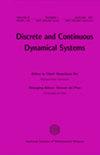Stabilization in two-species chemotaxis systems with singular sensitivity and Lotka-Volterra competitive kinetics
IF 1.1
3区 数学
Q1 MATHEMATICS
引用次数: 0
Abstract
The current paper is concerned with the stabilization in the following parabolic-parabolic-elliptic chemotaxis system with singular sensitivity and Lotka-Volterra competitive kinetics, $ \begin{equation} \begin{cases} u_t = \Delta u-\chi_1 \nabla\cdot (\frac{u}{w} \nabla w)+u(a_1-b_1u-c_1v) , \quad &x\in \Omega\cr v_t = \Delta v-\chi_2 \nabla\cdot (\frac{v}{w} \nabla w)+v(a_2-b_2v-c_2u), \quad &x\in \Omega\cr 0 = \Delta w-\mu w +\nu u+ \lambda v, \quad &x\in \Omega \cr \frac{\partial u}{\partial n} = \frac{\partial v}{\partial n} = \frac{\partial w}{\partial n} = 0, \quad &x\in\partial\Omega, \end{cases} \end{equation}~~~~(1) $ where $ \Omega \subset \mathbb{R}^N $ is a bounded smooth domain, and $ \chi_i $, $ a_i $, $ b_i $, $ c_i $ ($ i = 1, 2 $) and $ \mu, \, \nu, \, \lambda $ are positive constants. In [25], among others, we proved that for any given nonnegative initial data $ u_0, v_0\in C^0(\bar\Omega) $ with $ u_0+v_0\not \equiv 0 $, (1) has a unique globally defined classical solution $ (u(t, x;u_0, v_0), v(t, x;u_0, v_0), w(t, x;u_0, v_0)) $ with $ u(0, x;u_0, v_0) = u_0(x) $ and $ v(0, x;u_0, v_0) = v_0(x) $ in any space dimensional setting with any positive constants $ \chi_i, a_i, b_i, c_i $ ($ i = 1, 2 $) and $ \mu, \nu, \lambda $. In this paper, we assume that the competition in (1) is weak in the sense that $ \frac{c_1}{b_2}<\frac{a_1}{a_2}, \quad \frac{c_2}{b_1}<\frac{a_2}{a_1}. $ Then (1) has a unique positive constant solution $ (u^*, v^*, w^*) $, where $ u^* = \frac{a_1b_2-c_1a_2}{b_1b_2-c_1c_2}, \quad v^* = \frac{b_1a_2-a_1c_2}{b_1b_2-c_1c_2}, \quad w^* = \frac{\nu}{\mu}u^*+\frac{\lambda}{\mu} v^*. $ We obtain some explicit conditions on $ \chi_1, \chi_2 $ which ensure that the positive constant solution $ (u^*, v^*, w^*) $ is globally stable, that is, for any given nonnegative initial data $ u_0, v_0\in C^0(\bar\Omega) $ with $ u_0\not \equiv 0 $ and $ v_0\not \equiv 0 $, $ \lim\limits_{t\to\infty}\Big(\|u(t, \cdot;u_0, v_0)-u^*\|_\infty +\|v(t, \cdot;u_0, v_0)-v^*\|_\infty+\|w(t, \cdot;u_0, v_0)-w^*\|_\infty\Big) = 0. $具有奇异灵敏度和Lotka-Volterra竞争动力学的两种趋化系统的稳定性
本文研究具有Lotka-Volterra竞争动力学的奇异灵敏度抛物-抛物-椭圆趋化系统的稳定性问题。 $ \begin{equation} \begin{cases} u_t = \Delta u-\chi_1 \nabla\cdot (\frac{u}{w} \nabla w)+u(a_1-b_1u-c_1v) , \quad &x\in \Omega\cr v_t = \Delta v-\chi_2 \nabla\cdot (\frac{v}{w} \nabla w)+v(a_2-b_2v-c_2u), \quad &x\in \Omega\cr 0 = \Delta w-\mu w +\nu u+ \lambda v, \quad &x\in \Omega \cr \frac{\partial u}{\partial n} = \frac{\partial v}{\partial n} = \frac{\partial w}{\partial n} = 0, \quad &x\in\partial\Omega, \end{cases} \end{equation}~~~~(1) $ 在哪里 $ \Omega \subset \mathbb{R}^N $ 是有界光滑域,那么 $ \chi_i $, $ a_i $, $ b_i $, $ c_i $ ($ i = 1, 2 $)及 $ \mu, \, \nu, \, \lambda $ 都是正常数。在[25]等文献中,我们证明了对于任意给定的非负初始数据 $ u_0, v_0\in C^0(\bar\Omega) $ 有 $ u_0+v_0\not \equiv 0 $,(1)具有唯一的全局定义经典解 $ (u(t, x;u_0, v_0), v(t, x;u_0, v_0), w(t, x;u_0, v_0)) $ 有 $ u(0, x;u_0, v_0) = u_0(x) $ 和 $ v(0, x;u_0, v_0) = v_0(x) $ 在任意的空间维度中,任意的正常数 $ \chi_i, a_i, b_i, c_i $ ($ i = 1, 2 $)及 $ \mu, \nu, \lambda $. 在本文中,我们假设(1)中的竞争是弱的,即 $ \frac{c_1}{b_2}<\frac{a_1}{a_2}, \quad \frac{c_2}{b_1}<\frac{a_2}{a_1}. $ 则(1)有唯一正常数解 $ (u^*, v^*, w^*) $,其中 $ u^* = \frac{a_1b_2-c_1a_2}{b_1b_2-c_1c_2}, \quad v^* = \frac{b_1a_2-a_1c_2}{b_1b_2-c_1c_2}, \quad w^* = \frac{\nu}{\mu}u^*+\frac{\lambda}{\mu} v^*. $ 得到了若干显式条件 $ \chi_1, \chi_2 $ 哪一个能保证正常数解 $ (u^*, v^*, w^*) $ 是否全局稳定,即对于任何给定的非负初始数据 $ u_0, v_0\in C^0(\bar\Omega) $ 有 $ u_0\not \equiv 0 $ 和 $ v_0\not \equiv 0 $, $ \lim\limits_{t\to\infty}\Big(\|u(t, \cdot;u_0, v_0)-u^*\|_\infty +\|v(t, \cdot;u_0, v_0)-v^*\|_\infty+\|w(t, \cdot;u_0, v_0)-w^*\|_\infty\Big) = 0. $
本文章由计算机程序翻译,如有差异,请以英文原文为准。
求助全文
约1分钟内获得全文
求助全文
来源期刊
CiteScore
2.50
自引率
0.00%
发文量
175
审稿时长
6 months
期刊介绍:
DCDS, series A includes peer-reviewed original papers and invited expository papers on the theory and methods of analysis, differential equations and dynamical systems. This journal is committed to recording important new results in its field and maintains the highest standards of innovation and quality. To be published in this journal, an original paper must be correct, new, nontrivial and of interest to a substantial number of readers.

 求助内容:
求助内容: 应助结果提醒方式:
应助结果提醒方式:


